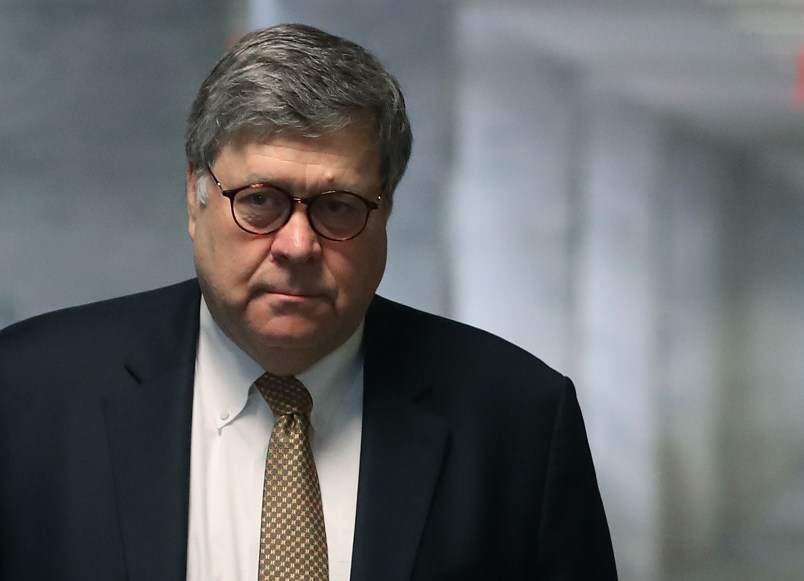In a letter to Congress Sunday briefly summarizing his assessment of special counsel Robert Mueller’s report, Attorney General Bill Barr indicated that he wasn’t necessarily prepared to turn the whole report over to Congress.
This could frustrate lawmakers on Capitol Hill, who have indicated that they want to see not just the report itself, but the underlying evidence.
Barr specifically brought up the presence of grand jury materials in Mueller’s report, which was submitted to the attorney general on Friday. Under the law, such material can’t be made public. Barr said that he had asked Mueller to help him identify which materials in his report fit this category.
He added that information in the report could “impact other ongoing matters” that Mueller farmed out to U.S. Attorney’s Offices around the country.
However, he acknowledged, the “public interest in this matter” while vowing to release as much information as is allowed legally and under DOJ policy.
“For that reason, my goal and intent is to release as much of the Special Counsel’s report as I can consistent with applicable law, regulations, and Departmental policies,” Barr wrote.
The attorney general gave no clear timeframe for when a redacted version of the report might be released.
“[T]he schedule for processing the report depends in part on how quickly the Department can identify the 6(e) material that by law cannot be made public,” Barr said.
It’s unlikely that lawmakers will be satisfied with Barr’s promises. House Judiciary Committee Chairman Jerry Nadler (D-NY) already raised suspicions about Barr’s decision not to charge President Trump with an obstruction offense and said that he planned to call Barr in to testify.
Barr’s letter did not address other major questions surrounding what information the Justice Department will disclose from Mueller’s findings. One concern that’s been raised by those seeking full disclosure of the report is how the Justice Department will handle any claims by the White House that certain evidence is subject to executive privilege — a legal concept that allows the president to keep conversations with advisors confidential. Trump’s personal legal team has suggested they would use this tactic to keep Mueller’s findings under wraps.
Legal experts have argued that executive privilege does not cover conduct probative of a crime.
The letter also did not specifically discuss the Justice Department policy not to publicly release derogatory information about individuals it does not charge. Barr had brought up the policy in written answers as part of his confirmation process, but his letter only references broadly his commitment to complying with “applicable law, regulations, and Department policy.”
It’s unclear if that policy will become a flashpoint in Congress’ efforts to learn more about Mueller’s investigation.







Now it’s war.
In his comment on the Barr letter, Josh said that Barr and Rosenstein had concluded that “since Mueller failed to “establish” coordination or conspiracy, Trump all but couldn’t be charged with obstruction of an investigation into that question.”
This policy seems totally wrongheaded to me. In charging Scooter Libby with obstruction of justice, Patrick Fitzgerald made the point that obstruction was analogous to throwing sand in the umpire’s eyes to prevent the umpire from making a call.
Not charging people with obstruction just because prosecutors couldn’t get sufficient evidence of the underlying crime would seem to blatantly reward obstruction: they would only charge a criminal with obstruction if the obstruction failed. If it succeeded, the criminal would be off the hook, both for the original crime and the obstruction.
Why bother to have obstruction on the books at all, if that’s the policy?
Fuck!
Now it’s up to Schiff, Nadler and Pelosi. As for me, I’m looking forward to a night of heavy drinking.
No collusion, it’s being said, and loudly. But does the Mueller report, and/or its background information, address other important issues, either directly or indirectly?
For example, does it say anything about competency on Trump’s part or on the part of those working on the campaign or Trump’s appointees? Perhaps so. Also, there are accompanying issues related to Trump’s response to threats posed Russian threats to our democracy, voting security, etc.
The Dems need to keep their powder dry and come up with a cogent, unified, but accurate interpretation as they gather information here. Grandstanding will distract from this effort.
Personally, I think an effective response would be a Trumpian one: that the Mueller report proves that Trump and the Republicans remain a constant threat to Social Security and healthcare. That’s the message by which the Dems took the House and one that can win the Presidency, if they don’t get too ridiculous.